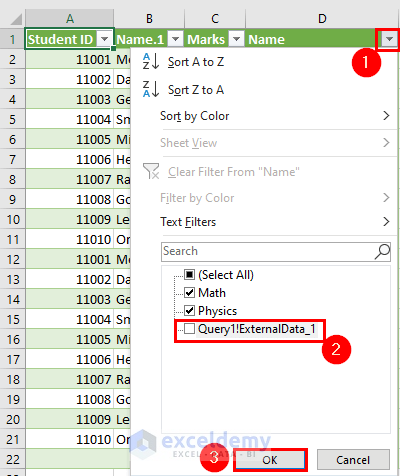Merge Two Excel Sheets: Easy 5-Step Method

When working with data in Excel, one common task is merging information from two different sheets into one comprehensive sheet. This process can be quite straightforward if you know the right steps. Whether you're combining sales data, project details, or any other type of dataset, merging two Excel sheets doesn't have to be a daunting task. Here's how you can do it easily in just five steps:
Step 1: Prepare Your Excel Sheets

Before you start merging, ensure both Excel sheets are properly formatted:
- Make sure the sheets have a common key or unique identifier for matching records.
- Check that headers are consistent in both sheets.
- Ensure there are no duplicate or blank rows which could complicate the merge.
❗ Note: If your sheets lack a common key, you'll need to manually create or align one to proceed with merging.
Step 2: Copy Data to One Sheet

To begin the merge, you'll need to consolidate the data from both sheets into one:
- Open both Excel sheets.
- Copy the data from one sheet (Sheet A) and paste it at the bottom of another sheet (Sheet B).
- Be sure to copy only the relevant data columns to maintain consistency.
Step 3: Sort and Remove Duplicates

Once you have combined the data:
- Select the merged data range.
- Click on "Data" in the Excel ribbon, then "Sort & Filter," and choose "Sort A to Z" or "Z to A" based on the key column.
- After sorting, click "Remove Duplicates" to eliminate any duplicate entries.
Step 4: Perform a VLOOKUP

If your data requires complex merging:
- Use the VLOOKUP function to pull data from one sheet into another based on a key column.
-
The VLOOKUP formula looks like this:
=VLOOKUP(lookup_value, table_array, col_index_num, [range_lookup]). - Drag the formula down to apply it to all rows in the column where you want to insert the data.
| Lookup Value | Table Array | Column Index | Range Lookup |
|---|---|---|---|
| The value you want to search for | The range containing the lookup values and the values to return | Which column to return the value from (in the table array) | Whether an exact match or approximate match is needed |

💡 Note: Remember, VLOOKUP can only search for values to the right of the lookup column.
Step 5: Review and Finalize

After you've merged and matched your data:
- Review your merged dataset for accuracy. Check for errors or unexpected results.
- Save your merged Excel sheet.
- Format the sheet for readability, possibly hiding unnecessary columns or adjusting column widths.
By following these steps, you've successfully combined data from two separate Excel sheets into one cohesive dataset. This method ensures that your data is merged accurately and efficiently, saving you time and reducing potential errors.
Why should I prepare my sheets before merging?

+
Preparing sheets by ensuring consistency in headers and keys allows for an easier and more accurate merge. It reduces the chance of errors when matching data from different sources.
Can I merge sheets without a common key?

+
It’s challenging without a common key as merging relies on matching records. However, if the data is structurally similar, you can manually align and match the data or use more advanced Excel techniques like Power Query.
How do I handle duplicates when merging sheets?

+
After merging data, use Excel’s “Remove Duplicates” feature to eliminate duplicates. You can also sort your data to identify duplicates more easily before removal.
What if I need to merge more than two sheets?

+
The process remains the same; you merge one sheet at a time into your primary sheet. Alternatively, use advanced tools like Power Query to merge multiple sheets in bulk.
What are the alternatives to VLOOKUP for merging data?

+
Excel offers INDEX and MATCH functions, which are more flexible than VLOOKUP. Also, Power Query, available in Excel, provides a robust way to merge data from multiple sources with more complex logic.